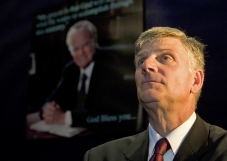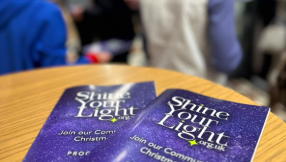One summer, a few years ago, I attended a Christian event held at a showground where the owners had erected some 'totem pole' type sculptures.
The event organisers had clearly deliberated about how to deal with these objects, and had chosen the simple – if inelegant – option of taping bin bags over them. These ominous shrouds slowly flapped looser over the course of the weekend, gradually revealing their dreaded contents. That was the last time that I went to that particular conference.
For many, Native American spirituality is straightforward paganism – even if they aren't really sure what paganism actually is. For most people perhaps, the most they really know about it is that it involves dream catchers and they see it as evil.
But a slightly closer look reveals something different. In many cases, it reveals a depth of wisdom and insight that Christians could do with considering. There are two medicine men from the aboriginal people of North America who have particularly caught my attention over the years. Both, as it happens, were Christian converts.
Nicholas Black Elk, a famous elder of the Oglala Lakota (Sioux) nation, is one of them. Born in 1863 he lived through perhaps the most turbulent time in the history of North America.
As a warrior he fought in some of the most iconic battles of that time, including the massacre at Wounded Knee and the Battle of Little Big Horn, aka the Battle of Greasy Grass Creek, alongside his famous cousin Crazy Horse. After the fighting was finally finished, and many of his people had been wiped out by a combination of disease, war and starvation, Black Elk became a Christian.
A strange thing to do, you might think – adopting the religion of his oppressors. But his Christianity was subversive: while he was enthusiastic about his new found Catholicism, even becoming a catechist, he accepted a Christ who suffered and died, rather than killed and dominated.
His Christianity, with its maintenance of many of the traditional ways and teachings of his people, was not the religion of the colonists. He was able to recognise in the Christian God a clear representation of the Wakan Tanka – the Great Spirit whom he had known from childhood.
For him to accept Yahweh was not to distance himself from the God of his people, but to deepen that relationship. The books about Black Elk are all worthwhile reading.
Similarly for Tatanga Mani (Walking Buffalo), aka John Mclean of the Stoney people in what is now Canada, an acceptance of the God of the Methodist missionaries he came to know was not a rejection of the Great Spirit.
Born in 1871, he too lived through the end of the era when aboriginal people were able to live freely in the lands of North America. Somehow though, Walking Buffalo was able to see beyond what happened to him and his people, to a transcendent reality. He recognised the underlying truth of God, and could see the way that the aboriginal people had expressed that same truth for many years.
Walking Buffalo, who became a Methodist preacher and a global envoy for peace, made very clear that he felt the aboriginal people had a much better handle on the truth of God than their White visitors.
"What was so bad about the way we prayed?" he lamented, questioning the way that white settlers had dismissed his people's ways as 'pagan':
"We were lawless people, but we were on pretty good terms with the Great Spirit, creator and ruler of all. You whites assumed we were savages. You didn't understand our prayers. You didn't try to understand.
"When we sang our praises to the sun or moon or wind, you said we were worshiping idols. Without understanding, you condemned us as lost souls just because our form of worship was different from yours."
Looking for somewhere to start? Try reading Black Elk Speaks by John Neihardt or Tatanga Mani: Walking Buffalo of the Stoneys by Grant MacEwan.
Simon Cross is a chaplain working for Oasis UK. He is also an author, researcher and community activist.
















